The UST Research Center for Culture, Arts, and Humanities (RCCAH) recently held its research forum “Diskurso Saliksik sa Kolehiyo 3: Musika, Ekonomiya, at Literatura.” RCCAH faculty researchers from the UST Conservatory of Music, UST Faculty of Arts and Letters Economics Department, and UST Faculty of Arts and Letters Literature Department presented their papers. The forum also featured the lecture of ethnomusicologist Dr. James Gabrillo of the University of Texas at Austin – Butler School of Music.
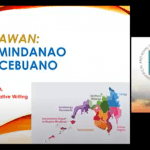
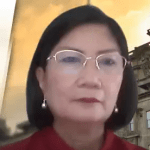

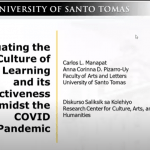
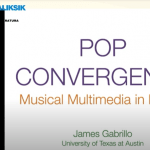

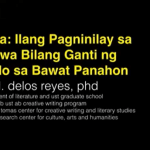
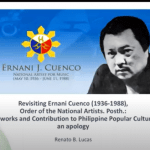
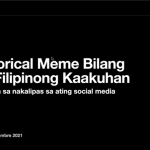
UST Graduate School Dean Prof. Michael Anthony C. Vasco, Ph.D., delivered the opening remarks and UST Faculty of Arts and Letters Dean Prof. Marilu R. Madrunio, Ph.D., delivered the closing remarks.
Dr. James Gabrillo discussed “Pop Convergence: Musical Multimedia in Manila,” based on his upcoming book Pop Convergence. The book tackles Filipino popular music and related Manila multimedia cultures from the 1990s until today. The lecture emphasized Manila’s multi-faceted culture emphasizes the kitsch and capitalist media popular media of the country.
Using specific examples by pop artists from the 1990s up to the present, the lecture traced the hallmark of artists and music icons of the country and their contribution not only to the music industry but also to cinema, television, street contests, bars, and even in online platforms. The research highlighted the converging influences of Philippine media’s artistic production and emphasized its cultural power in the Filipino society.
Musicology
The first panel featured speakers from the UST Conservatory of Music that included Assoc. Prof. Maria Alexandra I. Chua, Ph.D., and Assoc. Prof. Renato B. Lucas, Ph.D., Chua, presented her research on “Danza Habanera to Danza Filipina: Transcultural Hybridity in Nineteenth-Century Global Modernity” which discussed how global and national influences are manifested in early Philippine-composed danza habaneras. With the presentation of music in the 19th century and early 20th century, the study highlighted how danza habanera, which is a foreign music genre comprising diasporic peninsular composers who migrated to the islands and those composed by local composers, are transformed into a localized vernacular practice that created a new aesthetic in musical expression distinctively called “danza Filipina.”
Musician Renato Lucas, presented his research on “Revisiting Ernani Cuenco (1936-1988), Order of the National Artist: Lifeworks and Contribution to Philippine Popular Culture, an apology.” The paper highlighted the contributions of Cuenco to the country. The study serves as a much-delayed eulogy, an apology revisiting Cuenco’s life-works. That, with the ‘quiet murmurs’ within the artistic community on the 1999 posthumous conferment of the Order of the National Artist (ONA), Cuenco remains relevant not only because of ONA, but because of his timeless relevance in the country’s long history of Philippine music.
Economics
The second panel featured speakers from the UST Faculty of Arts and Letters Department of Economics were Assoc. Prof. Carlos L. Manapat, Ph.D., and Ms. Anna Corinna Pizarro-Uy.
Manapat and Pizarro-Uy presented their research on “Evaluating the Culture of Online Learning and its Effectiveness Amidst the Pandemic.”
The researchers used empirical data on gathering their sources through Structural Equation Modelling. Through online surveys of UST students, they came up with the outcome that human entities (learner quality, support system quality, and instructor quality) have significant impact on perceived satisfaction and not the non-human entities (technical system quality, information quality, service quality, educational system quality).
Literary and Cultural Studies
The third panel featured speakers from the UST Faculty of Arts and Letters Department of Literature composed of Mr. Paul A. Castillo, Assoc. Prof. Ralph S. Galan, and Dr. Joselito D. Delos Reyes.
Poet Paul A. Castillo, presented his paper “Ang Historical Meme Bilang Mito Ng Filipinong Kaakuhan,” which discussed the online culture of Filipinos to recreate historical people and events as strange memes that can be seen on Facebook.
The study presented samples of memes found in social media sites, particularly in History Memes PH in Facebook, and applied an in-depth literary theoretical analysis on it to see how meme-making becomes a new form of myth-making. Thus, online memes become an additional underscore of cultural awareness of the Filipino community in social media.
Center for Creative Writing and Literary Studies Assistant Director Galan, presented his research on “Labaw sa Bulawan: Translating Mindanao Poetry from Cebuano into English.” The paper discussed the important role of literary translation in the preservation and dissemination of Regional Literature.
This RCCAH-funded research presented a translation of 300 selected Mindanao poems from Cebuano into English with an accompanying exegetic essay that would focus both on the theory and praxis of the translation process involved in the ferrying across of the poems from source language to target language. The research project aimed to show that the art of translation is a transformative art; thus, “Labaw sa Bulawan” (or translated as “More than Gold”), proves that poetry, no matter how much is lost in translation, is as worthy as the purest gold.
Multi-awarded writer Delos Reyes, presented his research “Ganti ng Tawa: Ilang Pagninilay sa Pagpapatawa Bilang Ganti ng Marhinalisado sa Bawat Panahon,” where he discussed the context of satire in the communication on new media platforms.
Using Hill’s narrative approach, the study examined the boundaries of satire through an in-depth analysis of the power of words and symbols that constitutes it. The research highlighted that humor serves as a refuge and a shield of the marginalized. Humor then, if taken into context, can be used as a communal and cultural voice in addressing the serious issues of society.
The Diskurso Saliksik webinar series of the UST Research Center for Culture, Arts, and Humanities is a series of research fora that promotes research studies in the humanities to encourage students and faculty members to engage in an active dialogue and critical discussion of issues and approaches in cultural and artistic analytical studies. It was first launched on March 25, 2021 during the 2021 Research Fortnight of the Office of the Vice Rector for Research and Innovation.




